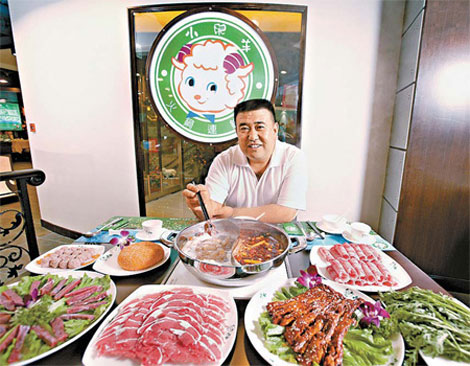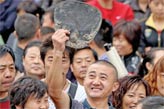Hot pot acquisition looks appetizing
Updated: 2011-05-27 10:47
By Meng Jing (China Daily European Weekly)
 |
|
Zhang Gang, founder of Little Sheep Group, says Yum!'s strong capability and expertise in managing world-class brands will significantly further the company's expansion in China and overseas. Provided to China Daily |
Despite Coca-Cola's rejection at an attempt to purchase a top Chinese juice maker over monopoly concerns in 2009, Yum! Brands' proposed bid for one of China's largest catering chains will likely have the blessing from Chinese authorities, lawyers and experts say.
Yum! has offered to pay HK$4.43 billion (406 million euros) for a 93 percent stake in the Inner Mongolia-based hot pot restaurant Little Sheep Group, according to a joint statement from the two companies on May 13.
Little Sheep Group is one of the few successful homegrown Chinese food restaurant companies.
The offer from Yum!, the owner of several fast-food chains including KFC and Pizza Hut, is HK$6.5 per share, 30 percent higher than the closing price on April 21, the last trading day before a filing to the Hong Kong stock exchange.
Financially speaking, Yum! occupied the top position in the catering chain business in China in 2010 and Little Sheep Group was No 2, according to a report from China Cuisine Association.
The transaction has a slim chance of being rejected by the Ministry of Commerce under anti-monopoly laws in China, says Howard Zhang, a partner of the international law firm Davis Polk & Wardwell.
"Coca-Cola's proposed acquisition of Huiyuan Juice Group would have hurt smaller domestic companies and limited consumer choices, since Huiyuan is the largest juice maker in China and Coca-Cola is the soft drink and beverage giant in the world. The move would have largely controlled the beverage market in China," Zhang says.
But the deal between Yum! and Little Sheep Group can hardly bring a similar effect to China's catering chain business as Chinese cuisines have many more choices than hot pot, he says.
Wang Zhile, director of the research center on transnational corporations under the Ministry of Commerce, says the improvement of the business environment for foreign investment in China is another reason that the approval of Yum!'s bid may have higher odds.
"The State Council's No 9 document in 2010 encourages foreign firms to participate in the reorganization and restructuring of domestic companies through mergers and acquisitions," Wang said in an interview with China Entrepreneur magazine on May 18, adding the word "encourages" is an optimistic signal.
However, Bob Poole, vice-president of China operations with the US-China Business Council, which has roughly 200 American companies that conduct business in China, including Coca-Cola, is not so optimistic.
"According to a survey among our member companies, a sizable minority - about 20 percent - reported that China's M&A regulations have discouraged them from making acquisitions in China, or created difficulties in ongoing deals," Poole says.
He says that transactions that comply with relevant laws and regulations between willing buyers and sellers should be approved.
China's anti-monopoly laws require firms to get government approval for mergers if their combined global sales exceed 10 billion yuan (1.1 billion euros), or each reports more than 400 million yuan in revenue in China for the previous fiscal year.
According to Ministry of Commerce spokesman Yao Jian, Yum!'s sales revenue in China hit 33.6 billion yuan in 2010, while Little Sheep pulled in nearly 2 billion yuan in sales revenues in 2010.
Yao reiterates that China will continue to open up its domestic market.
The public relations department of the Yum! China division says it fully supports the government review, but declined to comment further.
After the transaction, Yum!'s holding in Little Sheep will increase from 27 percent to 93 percent.
The remaining 7 percent will be held by the founder and current chairman of Little Sheep, Zhang Gang, and a non-executive member of the board, Chen Hongkai.
"I believe that the strong capability and expertise Yum! has in managing world-class brands and growing restaurant networks will significantly further Little Sheep's development in China and overseas," Zhang Gang said on Little Sheep's official micro blog on Sina.com on May 15.
He also said the company has been operating with an open mind and a global vision since it was founded in 1999.
Zhang Gang said that he will not step down after the completion of the transaction and will keep providing high quality and healthy Chinese cuisine for customers.
Kang Jianhua, restaurant and catering business analyst with Shenzhen-based CIConsulting, says this is a deal that can benefit both parties.
"Little Sheep has encountered a bottleneck after its rapid expansion in the early days due to the lack of standardized cuisine and poor innovation," Kang says, adding that the company's revenue in the first four months of 2011 is at the same level as last year, indicating a slower growth.
E-paper

Thawing out
After a deep freeze in sales during the recession, China’s air conditioner makers are bouncing back
Preview of the coming issue
Cool Iron lady
Of good and evil
Specials

Truly a super woman
Li Yuchun first came to prominence in 2005 as the Super Girl winner, and since then has become an international star.

Pearls of wisdom
Chinese pearl farmers dominate the world market but now want to work smarter, not harder

Finding the true value
Limited access to qualified appraisers makes investing in antiques a risky proposition
